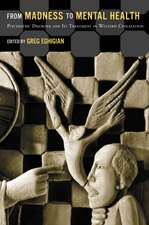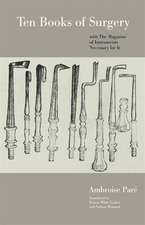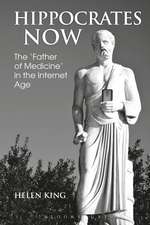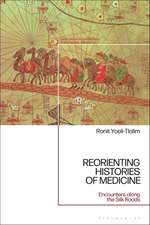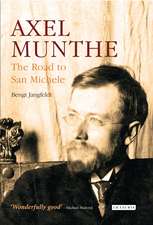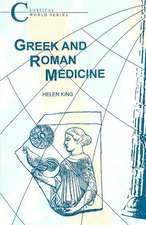A Cultural History of Disability: Volumes 1-6: The Cultural Histories Series
Editat de Professor David Bolt, Professor Robert McRueren Limba Engleză Quantity pack – 17 apr 2024
| Toate formatele și edițiile | Preț | Express |
|---|---|---|
| Quantity pack (2) | 892.02 lei 3-5 săpt. | |
| Bloomsbury Publishing – 17 apr 2024 | 892.02 lei 3-5 săpt. | |
| Bloomsbury Publishing – 5 feb 2020 | 3138.94 lei 3-5 săpt. |
Din seria The Cultural Histories Series
- 13%
 Preț: 204.45 lei
Preț: 204.45 lei - 43%
 Preț: 490.99 lei
Preț: 490.99 lei - 13%
 Preț: 191.26 lei
Preț: 191.26 lei - 30%
 Preț: 511.46 lei
Preț: 511.46 lei - 30%
 Preț: 542.77 lei
Preț: 542.77 lei - 43%
 Preț: 419.45 lei
Preț: 419.45 lei - 43%
 Preț: 440.48 lei
Preț: 440.48 lei - 43%
 Preț: 441.17 lei
Preț: 441.17 lei - 30%
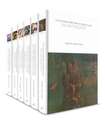 Preț: 2850.60 lei
Preț: 2850.60 lei - 30%
 Preț: 2849.15 lei
Preț: 2849.15 lei - 13%
 Preț: 200.89 lei
Preț: 200.89 lei - 5%
 Preț: 3138.94 lei
Preț: 3138.94 lei - 30%
 Preț: 510.27 lei
Preț: 510.27 lei - 43%
 Preț: 419.45 lei
Preț: 419.45 lei - 30%
 Preț: 511.74 lei
Preț: 511.74 lei - 13%
 Preț: 202.66 lei
Preț: 202.66 lei - 43%
 Preț: 440.48 lei
Preț: 440.48 lei - 13%
 Preț: 187.70 lei
Preț: 187.70 lei - 43%
 Preț: 418.49 lei
Preț: 418.49 lei - 30%
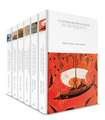 Preț: 2847.93 lei
Preț: 2847.93 lei - 13%
 Preț: 189.02 lei
Preț: 189.02 lei - 30%
 Preț: 544.48 lei
Preț: 544.48 lei - 13%
 Preț: 189.02 lei
Preț: 189.02 lei - 30%
 Preț: 543.66 lei
Preț: 543.66 lei - 30%
 Preț: 542.84 lei
Preț: 542.84 lei - 30%
 Preț: 511.14 lei
Preț: 511.14 lei - 30%
 Preț: 512.37 lei
Preț: 512.37 lei - 30%
 Preț: 510.86 lei
Preț: 510.86 lei - 43%
 Preț: 419.45 lei
Preț: 419.45 lei - 30%
 Preț: 2699.93 lei
Preț: 2699.93 lei - 43%
 Preț: 419.45 lei
Preț: 419.45 lei - 43%
 Preț: 416.26 lei
Preț: 416.26 lei - 30%
 Preț: 3006.52 lei
Preț: 3006.52 lei - 43%
 Preț: 439.79 lei
Preț: 439.79 lei - 13%
 Preț: 202.22 lei
Preț: 202.22 lei - 43%
 Preț: 419.45 lei
Preț: 419.45 lei - 43%
 Preț: 440.48 lei
Preț: 440.48 lei - 43%
 Preț: 440.48 lei
Preț: 440.48 lei - 40%
 Preț: 488.97 lei
Preț: 488.97 lei - 43%
 Preț: 414.88 lei
Preț: 414.88 lei - 30%
 Preț: 2854.02 lei
Preț: 2854.02 lei - 13%
 Preț: 189.02 lei
Preț: 189.02 lei - 43%
 Preț: 416.26 lei
Preț: 416.26 lei - 43%
 Preț: 419.03 lei
Preț: 419.03 lei - 13%
 Preț: 188.39 lei
Preț: 188.39 lei - 30%
 Preț: 543.36 lei
Preț: 543.36 lei - 43%
 Preț: 489.75 lei
Preț: 489.75 lei
Preț: 892.02 lei
Preț vechi: 1132.70 lei
-21% Nou
Puncte Express: 1338
Preț estimativ în valută:
170.77€ • 175.72$ • 143.95£
170.77€ • 175.72$ • 143.95£
Carte disponibilă
Livrare economică 08-22 februarie
Preluare comenzi: 021 569.72.76
Specificații
ISBN-13: 9781350436763
ISBN-10: 1350436763
Ilustrații: 200 bw illus
Dimensiuni: 258 x 179 x 61 mm
Greutate: 2.4 kg
Editura: Bloomsbury Publishing
Colecția Bloomsbury Academic
Seria The Cultural Histories Series
Locul publicării:London, United Kingdom
ISBN-10: 1350436763
Ilustrații: 200 bw illus
Dimensiuni: 258 x 179 x 61 mm
Greutate: 2.4 kg
Editura: Bloomsbury Publishing
Colecția Bloomsbury Academic
Seria The Cultural Histories Series
Locul publicării:London, United Kingdom
Caracteristici
Chapter-length essays include a wide range of case material and give a more detailed and nuanced overview than the shorter encyclopedic style entries found elsewhere
Notă biografică
David Bolt is Professor and Director of the Centre for Culture and Disability Studies at Liverpool Hope University, UK. He is founding Editor-in-Chief of the Journal of Literary and Cultural Disability Studies. His books include Changing Social Attitudes Towards Disability: Persepctives from Historical, Cultural and Educational Studies (2014) and, as co-editor, Disability, Avoidance and the Academy: Challenging Resistance (2015).Robert McRuer is Professor of English at George Washington University, USA. His book Crip Theory: Cultural Signs of Queerness and Disability (2006) was awarded the MLA's Alan Bray Memorial Book Award and his other publications include, as co-editor with Anna Mollow, Sex and Disability (2012).
Cuprins
Volume 1: A Cultural History of Disability in AntiquityEdited by Christian Laes, University of Manchester, UK1. Introduction: How and Whether to Say 'Disability' in Ancient Greek and Latin, Christian Laes2. Atypical Bodies: Extraordinary Body Treatment and Consideration, Caroline Husquin,3. Mobility Impairment: Identifying Lived Experiences in Roman Italy, Emma-Jayne Graham4. Chronic Pain and Illness: Pain and Meaning in Graeco-Roman Antiquity, Laurien Zurhake5. Blindness: Visual Impairments in Antiquity, Frederik Van den Abeele6. Deafness: Sensory Impairment as Communication Disability, Past and Present, Ellen Adams7. Speech: Lack of Language, Lack of Power: Social Aspects of the Discourse about Communication Disorders in the Graeco-Roman World, Peter Kruschwitz8. Learning Difficulties: Intellectual Disability (= ID) in the Ancient Near East (ANE), Classical and Late Antiquity, Edgar Kellenberger9. Mental Health Issues: Theory and Practice in the Ancient World, Jerry TonerVolume 2: A Cultural History of Disability in the Middle AgesEdited by Jonathan Hsy, George Washington University, USA, Tory V. Pearman, Miami University, Ohio, USA, and Joshua R. Eyler, Rice University, USA1. Atypical Bodies: Seeking after Meaning in Physical Difference, John P. Sexton2. Mobility Impairments: The Social Horizons of Disability in the Middle Ages, Richard H. Godden3. Chronic Pain and Illness: Reinstating Crip-Chronic Histories to Forge Affirmative Disability Futures, Alicia Spencer-Hall4. Blindness: Evolving Religious and Secular Constructions and Responses, Edward Wheatley5. Deafness: Reading Invisible Signs, Julie Singer6. Speech: Medieval Representations of Speech Impairments, Kisha G. Tracy7. Learning Difficulties: Ideas about Intellectual Diversity in Medieval Thought and Culture, Eliza Buhrer8. Mental Health Issues: Folly, Frenzy, and the Family, Aleksandra PfauVolume 3: A Cultural History of Disability in the RenaissanceEdited by Susan Anderson, Sheffield Hallam University, UK and Liam Haydon, United Kingdom Research and Innovation, UK1. Atypical Bodies, Simone Chess2. Mobility Impairment, Liam Haydon and Edmond Smith3. Pain, Adleen Crapo4. Blindness, Bianca Frohne5. Deafness, Jennifer Nelson6. Speech, Susan Anderson7. Learning Difficulties, Emily Lathrop8. Mental Health, Sonya Freeman LoftisVolume 4: A Cultural History of Disability in the Long Eighteenth CenturyEdited by D. Christopher Gabbard, University of North Florida, USA and Susannah B. Mintz, Skidmore College, USA1. Atypical Bodies: Anomalous Bodies in the Eighteenth Century, Sara van den Berg2. Mobility Impairment, David Turner3. Chronic Pain: Chronic Pain and Illness in the Long Eighteenth Century, Isabella Lucy Cooper4. Blindness: Conversations with the Blind, or "Aren't You Surprised I Can Speak?", Kate E. Tunstall5. Deafness: Deafness in the Age of Enlightenment, Kristin Lindgren6. Speech: Speech and Disability in the Long Eighteenth Century, Dwight Codr and Jared Richman7. Learning Difficulties: Intellectual disability in the long eighteenth century, C. F. Goodey and Simon Jarrett8. Mental Health Issues: Listening for Ghosts: Madpeople in the Eighteenth Century, Allison HobgoodVolume 5: A Cultural History of Disability in the Long Nineteenth CenturyEdited by Joyce Huff, Ball State University, USA and Martha Stoddard Holmes, California State University San Marcos, USA1. Atypical Bodies: The Cultural Work of the Nineteenth-Century Freak Show, Nadja Durbach2. Mobility Impairment: From the Bath Chair to the Wheelchair, Karen Bourrier3. Chronic Pain and Illness: "The Wounded Soldiery of Mankind," Maria Frawley4. Blindness: Creating and Consuming a Non-Visual Culture, Vanessa Warne5. Deafness: Representation, Sign Language, and Community, c. 1800-1920, Esme Cleall6. Speech: Dysfluent Temporalities in the Long Nineteenth Century, Daniel Martin7. Learning Difficulties: The Transformation of "Idiocy" in the Nineteenth Century, PatrickMcDonagh8. Mental Health Issues: Alienists, Asylums, and the Mad, Elizabeth J. DonaldsonVolume 6: A Cultural History of Disability in the Modern AgeEdited by David T. Mitchell, George Washington University, USA and Sharon L. Snyder, George Washington University, USA1. Atypical Bodies, Bee Scherer2. Mobility Impairment, Fiona Kumari Campbell3. Chronic Pain, Theodora Danylevich4. Blindness, Tanya Titchkosky and Rod Michalko5. Deafness, Sam Yates6. Speech, Zephyrous Zahari7. Learning difficulties, Owen Barden8. Mental Health Issues, Anne McGuire


